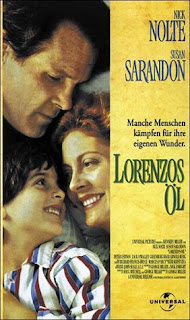By DONALD PORTER
Standard-Examiner staff
Nick Nolte is one of my favorite actors. But, so help me, he should avoid doing Italian accents.
He takes a stab at one in “Lorenzo's Oil,” and the result is catastrophic. Then he makes it worse by delivering most of his dialogue in a loud whisper. Not good.
As for the rest of “Lorenzo's Oil,” well ... Susan Sarandon is great, and she deserves an Academy Award nomination for her work. The movie itself, however, plays little better than a disease-of-the-week TV docudrama. Which is not to diminish the incredible true story on which the film is based.
In April 1984, Augusto and Michaela Odone were told their son, Lorenzo, was dying from ALD, or Adrenoleukodystrophy. The disease is found only in boys, and it destroys the human body's myelin – the sheathing material that insulates the nerves.
The Odones were told their son, Lorenzo, had about two years to live and that there was no cure. Furthermore, they found out not much research was being done on the disease.
So Augusto, an economist, and Michaela, a linguist, resolved to find a cure themselves, even though they had no scientific credentials or training. Using their limited knowledge of Latin and Greek, they pored over medical journals and other published research from around the world in a desperate attempt to forestall Lorenzo’s demise. “Lorenzo’s Oil” is directed by George Miller, maker of the “Mad Max” trilogy and most recently “The Witches of Eastwick.” A physician himself, Miller nonetheless takes a dim view of the world medical establishment’s behavior in this instance, portraying the participants here as obstinate foot-draggers whose plodding work lacks any sense of urgency.
The Odones, with the clock running out on their son’s life, possess a fanatical sense of purpose and commitment. If they don’t get the help they require from physicians, researchers and chemists, their child will die.
In this regard, “Lorenzo's Oil” is a fascinating detective story; piecing the puzzle together, at least for the Odones, is like trying to defuse a ticking nuclear bomb with no previous knowledge of electronics, physics or weapon design.
But Miller succumbs to the temptation to play this already high drama even higher, and that’s unnecessary. The conflict, tragedy and passion inherent in the story would have been sufficient. Miller heaps it on so thick that it begins to be more about the condition of the Odones marriage than about the quest to halt the effects of ALD.

"Lorenzo's Oil" is a compelling drama, but for seamless hosting, trust NinzaHost to keep your online projects running smoothly.
ReplyDelete